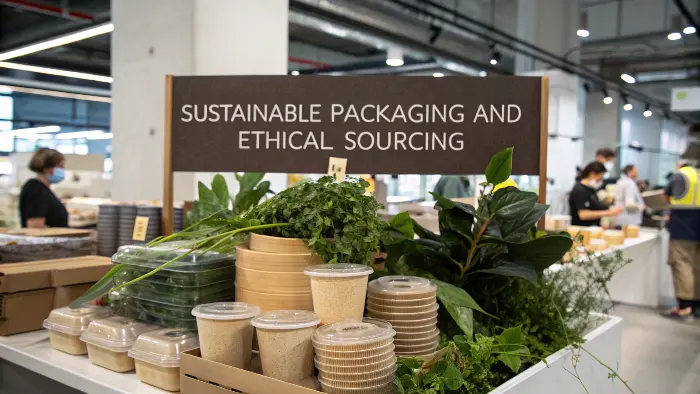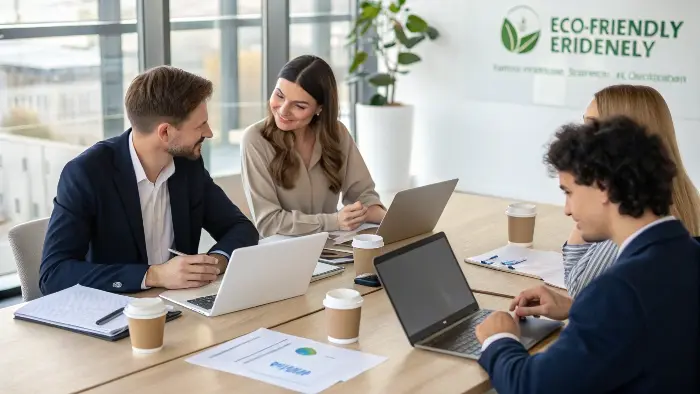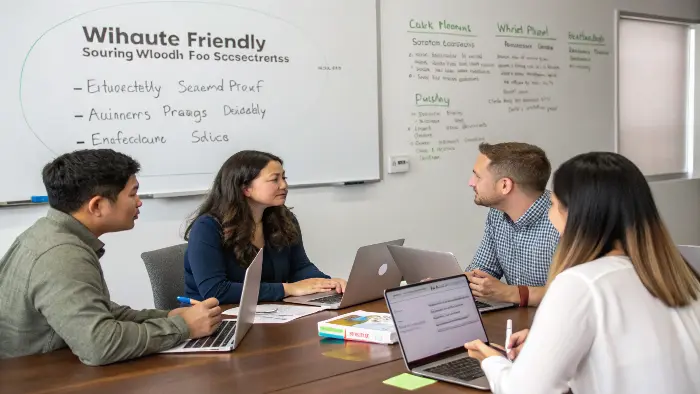Struggling to find genuine eco-friendly coffee accessories wholesale? Misleading claims and high costs are frustrating. You need reliable, sustainable options without the greenwashing headache.
Source wholesale eco-accessories by verifying certifications (BPI, FSC), vetting supplier transparency, assessing product quality and functionality, and understanding the full lifecycle of materials. This ensures genuine sustainability.
I get it. The world of "eco-friendly" can be a jungle. One minute you think you’ve found the perfect sustainable stirrer, the next you’re tangled in a web of confusing jargon and questionable claims. As someone who lives and breathes this stuff at Ecosourcecn, I’ve seen countless buyers like Jacky go through this. He once told me, "It felt like I needed a PhD in materials science just to buy a coffee cup!" But trust me, it doesn’t have to be that complicated. Let’s cut through the noise and get you sourcing with confidence. It’s actually simpler than you think when you know what to look for.
What Key Certifications Should I Look For in Eco-Friendly Coffee Accessories?
Worried about greenwashing? Choosing uncertified "eco" products can harm your brand and the planet. You need proof of genuine sustainability for peace of mind.
Look for BPI/EN13432 for compostability, FSC for responsible wood/paper, and Rainforest Alliance for ethical farming. These certifications validate claims and ensure true eco-friendliness.
Certifications are your best friends in this game, seriously! They’re like a trusted stamp of approval. Without them, you’re just taking a supplier’s word for it, and let’s be honest, sometimes words can be… flexible. I always tell Jacky, "If there’s no cert, there’s no cert-ainty!" Cheesy, I know, but it sticks! It’s the first thing I look for; if they ain’t got the papers, I ain’t got the time.
Understanding the Alphabet Soup of Green Certs:
| It can feel like you’re trying to decipher ancient hieroglyphics sometimes, but a few key ones will cover most of your coffee accessory needs. Trust me, getting familiar with these will save you a ton of headaches down the line. | Certification | What it Means for Coffee Accessories | Why It Matters for You (The Buyer) |
|---|---|---|---|
| BPI / EN13432 | Certifies products (like PLA cups, CPLA lids/cutlery) are industrially compostable. BPI is North American, EN13432 is European. | Ensures items will break down in a commercial composting facility, not just sit in a landfill. Crucial for "compostable" claims. | |
| FSC (Forest Stewardship Council) | Guarantees that wood or paper products (like stirrers, sleeves, paper cups) come from responsibly managed forests. | Supports sustainable forestry, biodiversity, and protects forest ecosystems. Great for your brand’s ethical image. | |
| Rainforest Alliance | Often seen on coffee beans, but also relevant if sourcing things like bamboo from certified farms. Ensures sustainable farming practices and worker welfare. | Shows a commitment to biodiversity, conservation, and fair treatment of workers in the supply chain. | |
| OK compost HOME | A specific certification for items that can be composted in a home composting environment. | Even better for end-users if they have home composts, as these items break down under less intense conditions than industrial. |
When we source new products for Ecosourcecn, checking these certs is step one. We don’t even begin a conversation if a supplier can’t provide valid, up-to-date documentation. It’s not about being difficult; it’s about upholding our promise of "Sustainable Solutions, Global Impact." Remember to not just see the logo, but ask for the certificate number and even verify it on the certifying body’s website if you’re dealing with a new supplier. It’s your due diligence! This extra step can save you a world of trouble and ensure you’re truly offering eco-friendly options. Think of it as your brand’s insurance policy against greenwashing. It’s like checking the car’s history before you buy it – just makes sense, right?
Beyond the Product: How Important is Sustainable Packaging and Ethical Sourcing from Suppliers?
Eco-products in plastic packaging? It’s a contradiction that confuses customers. You need suppliers whose entire operation reflects your sustainable values, not just the product itself.
Very important! Sustainable packaging (recyclable/compostable) and ethical sourcing (fair labor, minimal environmental impact) from suppliers demonstrate a holistic commitment to sustainability, strengthening your brand.

Oh, this is a big one! You’ve gone to all the trouble of sourcing these beautiful, compostable PLA-lined cups, and then they arrive at your warehouse wrapped in layers of single-use plastic bubble wrap and packed in virgin plastic bags. The irony, right? It’s like getting a salad delivered in a styrofoam container. It just doesn’t make sense and can totally undermine your message. Honestly, it drives me nuts when I see this.
Looking at the Bigger Picture:
When I talk to suppliers, I always ask about their packaging and their own operational footprint. It’s not just about the product they’re selling me; it’s about their whole philosophy.
- Packaging of Your Supplies:
- Minimalism is Key: Does the supplier use excessive packaging? Or do they aim for just enough to protect the product? I once received a tiny sample in a massive box filled with plastic peanuts – overkill!
- Material Matters: Are their shipping boxes made from recycled content? Do they use paper-based tape instead of plastic? Are void fills biodegradable (like starch peanuts) or recyclable paper? These little things add up.
- Bulk Options: Can they offer products with less individual wrapping if you’re buying in large wholesale quantities? This can significantly reduce waste. We always push for this.
- Ethical Sourcing & Social Responsibility:
- Labor Practices: This is a bit harder to verify directly, but good suppliers are often transparent about their factory conditions or may have certifications like SA8000 or Fair Trade (though Fair Trade is more common for agricultural products like coffee itself). Do they talk about worker welfare? If they’re cagey, that’s a red flag for me.
- Environmental Impact of Production: Do they mention efforts to reduce water usage, energy consumption, or waste in their manufacturing processes? Every little bit helps their footprint and yours.
- Community Engagement: Some suppliers actively engage in or support environmental or social initiatives. It shows they’re thinking beyond just profit.
Jacky, for instance, told me he once dropped a potential supplier because even though their bamboo stirrers were FSC certified, their sample shipment was an absolute disaster of plastic packaging. He said, "It told me they didn’t really get it." And he’s right. You’re looking for partners who are aligned with your values through and through. At Ecosourcecn, we constantly review our own packaging, striving to use recycled materials and minimize waste in our shipments to clients. It’s an ongoing journey, but it’s crucial for authentic sustainability. It’s not just about the destination, but how you get there.How Can Building Strong Supplier Relationships Boost My Eco-Friendly Sourcing Strategy?
Constantly hunting for new eco-suppliers is exhausting. Price fluctuations and inconsistent quality create headaches. You need stable, reliable partners you can trust for the long haul.
Strong supplier relationships lead to better pricing, consistent quality, early access to new eco-innovations, and collaborative problem-solving. It’s a partnership, not just a transaction.

This is something I really try to hammer home with buyers. In the world of sustainable sourcing, your suppliers aren’t just order-takers; they’re vital partners in your eco-journey. Think about it: this field is evolving so fast! New materials, new regulations, new consumer demands – it’s a whirlwind. Having a supplier you can actually talk to, who understands your business and your goals, is invaluable. It’s like having a good mechanic; you trust them, and they look out for you.
More Than Just a PO Number:
I’ve seen the difference firsthand. Buyers who treat suppliers like a revolving door, always chasing the absolute lowest price, often end up with inconsistent quality, unreliable stock, and zero support when things go wrong. But those who invest in building relationships? They reap the rewards.
- Better Communication: When you have a good relationship, you can have open conversations. Worried about a potential price increase? Need a custom solution? A good supplier will listen and work with you. I had a client who needed a slightly different sized bagasse container, and because we had a solid relationship, we worked with our manufacturing team to make it happen.
- Early Access to Innovation: We at Ecosourcecn are always on the lookout for the next big thing in sustainable materials. Our long-term clients are often the first to hear about new products and get samples. Why? Because we know they’re serious and value innovation. It’s a win-win.
- Reliability and Consistency: Suppliers are more likely to prioritize orders and maintain quality for clients they have a good relationship with. When stock is tight, guess who gets looked after first? Hint: it’s not the guy who haggles over every penny.
- Problem Solving: Issues happen. A shipment might get delayed, or a product might not be exactly as expected. A supplier you have a relationship with will work with you to solve the problem, not just pass the buck. That’s true partnership.
- Feedback Loop: Jacky often gives us feedback on products, which is incredibly valuable. He might say, "The CPLA lids are great, but could the sip-hole be slightly larger for thicker smoothies?" This kind of input helps us improve and develop better solutions for everyone. It becomes a collaborative effort.
It takes time to build these relationships, sure. It means more than just firing off emails. It might involve video calls, understanding their challenges, and being a good client yourself (clear orders, timely payments). But the payoff in terms of stability, innovation, and peace of mind is huge. It transforms sourcing from a chore into a strategic advantage. It’s an investment, not an expense.What Are Some Common Pitfalls to Avoid When Sourcing Wholesale Eco-Accessories?
Falling for "greenwashing" or choosing impractical "eco" items can be costly. You need to avoid common mistakes to ensure your sustainable sourcing is truly effective.
Avoid vague "eco-friendly" claims without proof, overlooking product functionality for aesthetics, ignoring local disposal infrastructure, and solely focusing on the lowest price over quality and certifications.

Navigating the world of wholesale eco-friendly accessories can feel like walking a tightrope sometimes. You want to do the right thing, but there are definitely a few banana peels along the way that can trip you up! I’ve seen even seasoned buyers make these mistakes, so it’s good to be aware. Don’t worry, we’ve all been there or close to it!
Sidestepping the Green Traps:
Here are a few common blunders I’ve observed and helped clients like Jacky steer clear of:
- The "Vague Green Claim" Trap: This is a classic. Products labeled "eco-friendly," "biodegradable" (without specifying conditions or certifications), "earth-friendly," or "natural." These terms mean very little without concrete proof and proper certification. "Biodegradable" is a big one – almost anything will biodegrade eventually, even if it takes hundreds of years and leaves microplastics behind! Always ask: How is it eco-friendly? Under what conditions does it biodegrade? What certifications back this up? If it sounds too good or too simple to be true, it probably is.
- Prioritizing Looks Over Practicality: I once saw a beautiful set of bamboo cutlery. It looked amazing! So chic, so rustic. But then we tested it, and the fork tines snapped trying to pick up a piece of cooked sweet potato. Useless! Aesthetics are important, sure, but the product has to work for its intended purpose. Always, always get samples and test them rigorously in real-world scenarios. Your customers won’t thank you for a pretty stirrer that breaks in their latte.
- Ignoring Local Waste Infrastructure: This is HUGE. You might source the most wonderfully certified industrially compostable PLA cups, but if your city or your customers’ areas don’t have accessible industrial composting facilities, those cups are likely to end up in landfill anyway, where they won’t break down as intended. It’s crucial to understand what disposal options are actually available and choose products that align. Sometimes, a highly recyclable option (like FSC certified paper with a water-based coating that can go in paper recycling) is better than a compostable one with no pathway to compost. I had to explain this to a very enthusiastic client once – their area had zero composting facilities. We switched to a recyclable paper option, and it was much more effective.
- The "Cheapest is Best" Fallacy: While budget is always a factor, especially for wholesale, chasing the absolute rock-bottom price on eco-products can be a false economy. Extremely low prices can sometimes indicate compromised material quality, poor manufacturing standards, lack of genuine certification (certs cost money!), or unethical labor practices. It’s about finding the best value, which includes quality, reliability, and genuine eco-credentials.
One time, Jacky was tempted by a super cheap offer on "biodegradable" bags. The price was almost too good to be true. We dug a little, asked for certs… and crickets. Turned out they were just standard plastic bags with an additive that made them fragment into microplastics faster. Bullet dodged! 🔥 It pays to be a little skeptical and do your homework.Conclusion
Sourcing wholesale eco-accessories effectively means prioritizing certifications, supplier transparency, and strong relationships. This guide helps you make truly sustainable choices for your business success.


